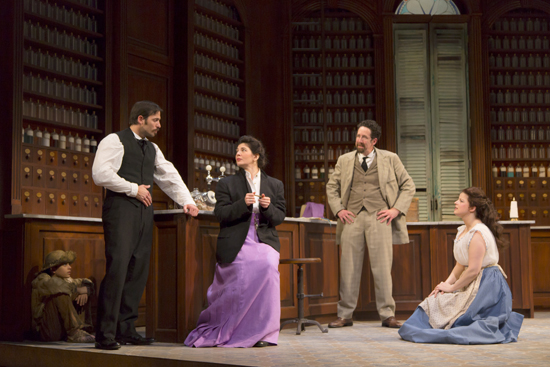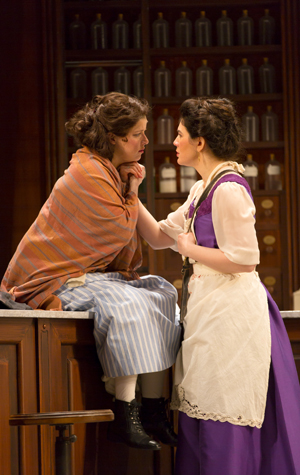It’s been 10 years since Melinda Lopez’s play Sonia Flew inaugurated the Wimberly Theatre at the Calderwood Pavilion. Familiar to Huntington Theatre Company audiences as an actor (she last appeared in David Cromer’s staging of Thornton Wilder’s Our Town, Lopez (GRS’00) the playwright is back with Becoming Cuba, a rich and riveting story set in Havana during the Spanish-American War.
Drawing on her Cuban roots and a time in history when “Cubans, Americans, and Spaniards are sharing the same air,” Huntington playwright-in-residence and former Huntington fellow Lopez says the play was sparked by a family legend about her Cuban great-grandmother, who at 16 refused to go to a Spanish internment camp. The facts are vague, but Lopez was told her great-grandmother instead “took her pet pig under her arms and walked up to the mountains to join the rebels.”
Commissioned by North Coast Repertory Theatre in San Diego, Becoming Cuba premiered last May, earning critical praise as a “worthy and witty work,” where history converges with magical realism. Set in the 1890s, it is the story of Adela (Christina Pumariega), who runs a pharmacy and is ultimately forced to choose, as conflict flares around her, between loyalty to country and loyalty to family. Political, passionate, and often comical, the play asks if freedom is something we all really want, Lopez says.
Sonia Flew won the Elliot Norton Award for Best New Play and the Independent Reviewers of New England Awards for Best Play and Best Production. “Since I arrived at the Huntington, people have asked when we would stage another new play by Melinda Lopez,” says Huntington artistic director Peter DuBois. He describes Becoming Cuba, directed by M. Bevin O’Gara (CFA’04), as “exuberant, passionate, and well worth the wait. It’s an incredible way to kick off Melinda’s new position as the Huntington’s playwright-in-residence.”
Lopez says she is thrilled to be returning to the Huntington, “my artistic home, and I am especially excited to again work with Bevin. She understands my sensibility and my humor. We are a terrific team.” The play runs through May 3 at the Calderwood Pavilion at the Boston Center for the Arts.
Bostonia spoke with Lopez about the play’s evolution, the challenges of a historical framework, and growing up dreaming of a lost Cuba.
Bostonia: Tell us about Becoming Cuba’s path to the Huntington stage.
Lopez: I completed a first draft in November of 2011, but I’ve been thinking about the play all my life and was doing intense research for a year before I started writing. You could say the play has been 50 years in the works. We had a staging at North Coast Repertory, which seats about 90 people, so this is a very big step up in terms of production values. I learned a lot with the San Diego production and have integrated a lot of changes.
How did you research the Spanish-American War years in Cuba?
I knew the time period and the location that the play was going to take place, and I had a very general understanding of the war and how Cuba came to be a possession of the United States for four years. Some of my family had lived through this war, and I’d heard stories of this terrible Spanish general, but that’s it. I had to learn what life was like for women then. You’re a writer—you get fascinated with one detail and you follow that thread. I spent a lot of time on the internet. I dreamed about the play, and who might be living in this city at this time.

Brandon Barbosa (from left), Juan Javier Cardenas, Christina Pumariega, Christopher Tarjan, and Rebecca Soler appear in the Huntington Theatre Company production of Melinda Lopez’s Becoming Cuba, at the Calderwood Pavilion at the BCA through May 3. Photo by T. Charles Erickson
Did you visit Cuba?
I did go to Cuba, but that was almost an accident. I had written the first draft, and I was feeling a lot of anxiety because I didn’t know what Havana looked like, and just as I was finishing the draft and wishing I could go, I got a call from a friend who leads humanitarian aid trips to Cuba. She said, “We have a trip and someone dropped out; are you interested?” It was like lightning struck. The pharmacy I visited in Havana is what you see on the set. I spoke with doctors and pharmacists. I felt what it was like to breathe the air there.
Tell us about your Cuban roots.
My parents were born and raised in Cuba. My two grandfathers’ roots go back to Spain, and my two grandmothers are from generations of Cubans. My parents left Cuba four months after the revolution, as part of the earliest wave of emigrants. I was born in Colombia, but we settled in Massachusetts. Part of being a child is hearing stories about when your parents were kids. My parents’ stories were a little bit different than my friends’ parents’ stories. We spoke Spanish at home and were very close with relatives. Most were in Miami. I felt very a deep connection to my family roots. My mother hates the heat, so she really thrives in the New England climate, and she doesn’t want to go to Miami. Both of my parents adopted and fiercely loved this country. Having been to Cuba, I would never want them to see it now.
Why did you choose to make Adela a pharmacist?
I cannot answer. It’s a mystery. I had an inkling of this woman. I knew who she was, but couldn’t quite figure out how she spent her day. I had her fixing other people; she’s soothing others, but she cannot be fixed. She’s cleaning gunshot wounds. She’s not a doctor, but she’s wise and smart and a bit of a magician. And then I did a lot of research and learned there were women pharmacists at this time. She’s married to a Spaniard, so things are a little easier for her. She’s part of an elite, and her intelligence, her street smarts, her business savvy all conspire to create an interesting character.
The play deals with the realities and morality of war, but your characters are fully humanized.
I think everyone in the play is very humanized. People have a job to do in wartime; they quell rebellion. Central character Adela, who runs a pharmacy, fights to remain loyal to Spain through the whole play at great personal cost. The places in the play I love the most are when I hate her the most, because she’s so strong. I feel so much compassion for her at the end, when she finally makes her choice. My central character is both a protagonist and a villain. There’s also a rebel soldier, a Spanish general who has killed many people. I don’t feel as a storyteller that I have to make everyone likable or redeem everyone, because in life some people aren’t redeemable. That’s part of the truth of the play.

Soler (left) and Pumariega portray Cuban women with torn loyalties in the time of the Spanish-American War in Lopez’s Becoming Cuba. Photo by T. Charles Erickson
The play has drawn critical praise for its use of historic characters as a kind of Greek chorus. Did these characters come about deep into the writing process?
The conquistador character was the first character I wrote. I was interested in how Europeans came to be there. He turned out to be very funny and he’s been alive forever, so he has a perspective on the world that’s unusual. He’s very nasty, he’s funny, and he’s very Spanish. When you look at the history of that island, there are native people there, there are soldiers who have died, there are children who have died—they all started speaking to me, they were all very funny, and they were coming back to tell us something important. My experience both of being Cuban and being around people living under extreme stress is that humor is how they survive. There was also the character of Teddy Roosevelt. I loved him and hated to lose him, but he just didn’t belong. There was a soldier who died in the attack on the Maine. My director wants to do the blooper reel, a parade of all the characters who were cut.
Is there any Spanish spoken in the play?
We make it very clear from the very first moment that everyone on stage is speaking Spanish and miraculously people can understand everything that’s being said. Sometimes characters speak English with a very bad accent. It’s a mind switch—the audience is told, this is Spanish, and I am speaking Spanish to you right now.
What are the play’s universal themes?
One theme is the longing for self-determination. It’s about sometimes recognizing that in order to go forward you have to burn everything down. That’s a metaphor, but it’s also literal in the play. My heroine lives in the past. She has a man and a life that are dead. All the forces in the play conspire to shake her out of that. The bravest thing in the play is that she decides to live. That’s something people of all ages and nationalities can understand. And there are the themes of sacrificing for your family and loving your country.
Tell us about the set.
Oh my God, it’s gorgeous. You’ll see a replica of the most authentic and beautiful 19th-century pharmacy. And the actors are beautiful. It’s the best-looking cast on stage right now in Boston, and so talented.
The Huntington Theatre Company’s production of Becoming Cuba runs at the Calderwood Pavilion at the Boston Center for the Arts, 527 Tremont St., Boston, through Saturday, May 3, 2014. Tickets may be purchased online, by phone at 617-266-0800, or in person at the BU Theatre, 264 Huntington Ave., or Calderwood box office. Patrons 35 and younger may purchase $25 tickets (ID required) for any production, and there is a $5 discount for seniors. Military personnel can purchase tickets for $15, and student tickets are also available for $15. Members of the BU community get $10 off (ID required). Call 617-266-0800 for more information. Follow the Huntington Theatre Company on Twitter at @huntington.















































Related Stories
A Plum Role for CFA Alum in Huntington’s Tartuffe
Award-winning actor brings wit and intelligence to Moliére’s Madame Pernelle
Huntington Closes Season with Drama about Bullying
Actors discuss the lessons of after all the terrible things I do
Huntington Theatre Company Wins Tony Award
Honored for continuous level of artistic achievement
Post Your Comment